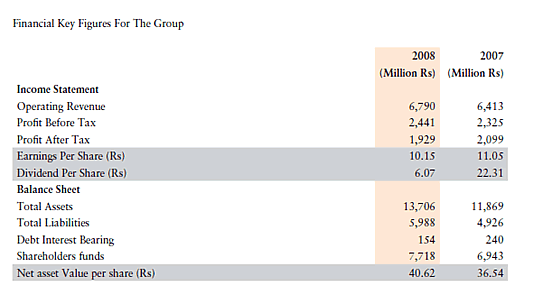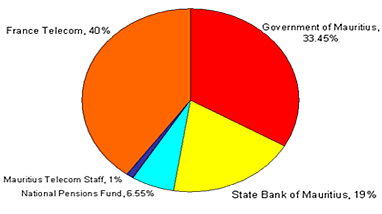 Mauritius Telecom (MT)
Mauritius Telecom (MT)
All data are collected in the Fiscal Year of 2008-2009.
Company Profile and History
Mauritius Telecom is a telecommunications and Internet service provider in Mauritius. Mauritius Telecom was founded in July 1992 by a merger between the former Overseas Telecommunications Services Ltd and Mauritius Telecommunication Services Ltd. As from that date, Mauritius Telecom became the major provider of voice, mobile, Internet and data communication services in Mauritius.
In 1996, Cellplus Mobile Communications Ltd, a mobile network operator and a fully owned subsidiary of Mauritius Telecom launched the GSM network in Mauritius and later during the same year Telecom Plus Ltd, another fully owned subsidiary of Mauritius Telecom as from 2006, launched dial-up internet access service.
In November 2000, France Telecom became the strategic partner of Mauritius Telecom by acquiring 40 percent of its shares. Following the partnership with France Telecom, Telecom Plus Ltd launched in 2002 broadband internet access which is branded under Wanadoo ADSL.
By combining the technological and global strength of France Telecom, and the local and regional experience of Mauritius Telecom, the two companies have been able to offer innovative and useful technologies and launched in June 2006 the Multiplay IPTV services branded as My.T which enabled Mauritius to become among the first countries in the world to launch IPTV services.
As from 17 April 2008, Mauritius Telecom re-branded its mobile and internet services as Orange. Cellplus Prepaid and Post Paid offers are now known as Orange Prepay and Post Pay offers and Telecom Plus dial-up internet access and Wanadoo ADSL offers are now known as Orange Dial-Up and Orange ADSL.
At the end of December 2008 Mauritius Telecom counted a total of over 1 million subscriptions to its fixed line, mobile, internet dial-up, broadband and My.T convergent services.
In Country Location
Telecom Tower, Edith Cavell Street, Port Louis, Mauritius; Tel: (230) 203 7000; Fax: (230) 208 1070
Services and Products
Mauritius Telecom provides a full spectrum of voice and data services over fixed, mobile and internet platforms. Mauritius Telecom also offers convergent services through My.T, its Multiplay-IPTV services. Television on mobile telephones has been introduced in May
2009. Telecom Plus Ltd is the main provider of Internet and value-added services for both individuals and business organizations; Cellplus Mobile Communications Ltd
offers a full range of digital mobile cellular services; Call Services Ltd
offers Telemarketing and Customer Relationship Management (CRM)services; and Teleservices (Mauritius) Ltd specialises in the production of both printed and on-line directories. The Company offers global connectivity via the SAT3/WASC/SAFE undersea fibre-optic cable and satellite systems.
Number of Employees
1,809 employees
Financial Information

Market Share
MT remains the main provider of fixed-line telephony services in Mauritius and, together with Data Communications Limited (DCL), accounts for 85% of the clients of international telephone services. Cellplus has a 60 percent market share
Business Objective
“To be a Premier World Class Infocom Services Provider”
Business Model
“Its growth strategy is based on innovation, whilst its commercial strategy is led by the concept of “Customer Satisfaction First”. In 2007, the Company successfully completed its organisational restructuring which constitutes a crucial step in its endeavour to become an integrated operator.
Mauritius Telecom is the country’s only telecommunications company that provides universal service and universal access. In embracing this responsibility, the Company has ongoing strategies to develop its networks throughout the country and provide effective services to all citizens and residents within the Republic of Mauritius.
Mauritius Telecom’s performance underlines the validity and relevance of the Company’s strategy for profitable growth, based on the development of broadband, mobile and converging technologies, which we have been pursuing relentlessly in recent years.
Mauritius Telecom Group has invested Rs 1.2 billion in 2008 in the development of its network infrastructure and systems. These investments were made on our fixed and mobile broadband networks, the deployment of the New Generation Network (NGN) and the enhancement of our country’s submarine cable connectivity, as well as for the set-up of the Customer Care and Billing System (CCBS), which is an innovative and integrated customer-relationship management system.
Mauritius Telecom is starting to reap the first benefits of its recent organisational restructuring and of its integrated-operator approach to the conduct of its business. The synergies accruing from these initiatives have had a positive impact on performance. The growth of our combined subscription base to over 1 million testifies to the increased efficiency of our commercial operations and the effectiveness of related commercial strategies.”
Ownership of Business

Benefits Offered and Relations with Government
The Telecommunications Act of 1998 laid the foundations for liberalising the telecommunications sector. However it was not until after the Information and Communication Technologies (ICT) Act of 2001 that liberalisation began in earnest. The telecommunications sector was liberalised partially in 2001 and fully by 2003. The 2001 ICT Act removed the exclusive rights granted to Mauritius Telecom (MT) over fixed (domestic and international) telecommunications services.
The Ministry of Information and Communication Technology is responsible for formulating telecommunications policy, administering programmes to improve telecommunications services and ensuring access to affordable info-communication services in Mauritius. The Information and Communications Technologies Authority (ICTA) is the national regulator for the ICT sector and postal services in Mauritius. Its key role is to implement and promote the government’s national policy objectives for the telecommunications sector. This regulatory body is not completely independent from political influence. As prescribed by the ICT Act of 2001, the ICTA is administered and managed by the ICT Board which consists of seven members: a chairperson appointed by the prime minister after consultation with the leader of the opposition, the secretary of home affairs or their representative, and five other members appointed by the minister of information technology and telecommunications after consultation with the ICT advisory council.
The ICTA is mandated to promote affordable and adequate access to quality ICT services through functional market-driven competition and regulatory principles. For mobile telephony and Internet, the operators normally indicate their intended tariffs to the ICTA. The ICTA makes its own recommendations based on cost based access charges and long range incremental cost models. The privatisation of the sector has resulted in a drastic fall in prices for international long distance calls and Internet connections.
Direct Peering Interconnection between mobile operators has been in place since May 2003 and led to a cut of more than 50 per cent in tariffs. As far as taxation is concerned, imported telephones for cellular networks or other wireless networks are not subject to custom duties. However, when they are sold internally, a 15 percent value added tax is levied. A 15 per cent tax is also imposed on the usage of mobile phones (calls and texts) and fixed-line telephones.
Given that almost all households in Mauritius are already connected to the fixed-line network and that almost everyone already uses a mobile phone, the country does not face any demographic pressure to develop further the telecom infrastructure.
In September 2007 the Ministry of Information and Communication Technology issued the country’s first national ICT policy paper. The government’s vision is to make the ICT sector the fifth pillar of the economy and transform Mauritius into a regional ICT hub.
In May 2009 the government imposed new taxes on phone firms of 5 percent of profit and 1.5 percent of sales.
Product Development
Mauritius Telecom has invested in technologies, such as FTTC (Fibre-to-the-Cabinet) and HSPA (High Speed Packet Access) and has extended broadband access to fixed-line and mobile customers almost everywhere in Mauritius. MT has also set up a company, ContinuityMauritius, together with Blanche Birger and ContinuitySA of South Africa to provide Business Continuity Management services to Mauritius Telecom as well as to other Mauritian businesses.
MT further introduced several tariff reductions in 2008: a reduction of up to 41% in international call tariffs using SEZAM prepaid cards; a reduction of 30 cents per minute on international call tariffs using code 020; a 20% decrease in the cost of ‘Mobile to Fixed’ calls in June 2008; and a reduction of between 21% and 45%, depending on the post-paid rental package, on post-paid mobile call tariffs. The company also introduced the “One Country, One Tariff” policy, by aligning inter-island tariffs between Mauritius and Rodrigues with those prevailing in mainland Mauritius and the Apple iPhone 3G was launched at the end of 2008.




